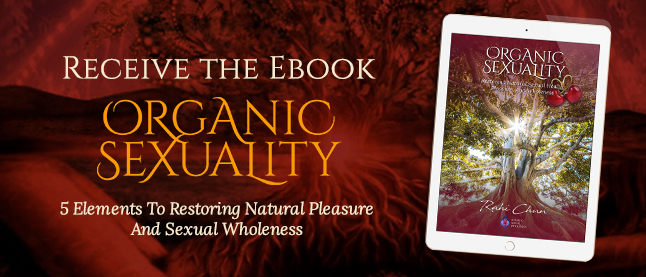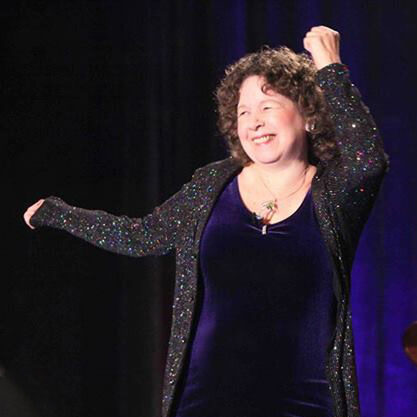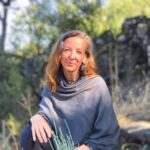
How Tantra, Yoni Massage, and Sexological Bodywork Can Restore Sexual Pleasure and Wholeness.
Share this episode:
Pamelah has been something of an angelic guide on my path as a somatic sexuality practitioner. We first met nearly 20 years ago at a week-long residential tantra retreat that involved learning to give and receive inner pelvic work, and fortuitously, we were paired to hold space for each other. It was my introduction to the powerful and effective practice of releasing past unintegrated emotions from the genitalia and inspired me to want to learn everything I could about it. Eleven years later, as I was considering transitioning professionally into Somatic Sex Education, our paths crossed again when she became my first professional client, and again I was inspired by our work together – by her sense of self-responsibility and ownership, by her courage to release and integrate past emotions from her body, and by her deep self-love and care for reclaiming her embodied sexual pleasure and wholeness. Pamelah is a world-renown master hand analyst and intuitive guide for clients, but to me, she will always be that shining light revealing the profound transformational healing available with somatic sexuality, and a wise and joyful encouragement along the path.
Today’s Guest:
Thirty years as a Master Hand Analyst, Pamelah Landers is at the top of her field. The #1 International Best Selling author of Hand Analysis products, Pamelah is deeply versed in decoding the lines, hand shapes and fingerprints in people’s hands as she explains in great detail that is easy to understand. She’s created 55 Information Products, including books and audios that dive deeply into details of hand markings.
Pamelah is also highly intuitive and provides insights for clients and students on a regular basis that are ‘to the point’ and implementable, practical, and down to earth. Using these insights, Pamelah co-leads courses on self-sovereignty and self-mastery that also includes tangible and implementable practices for stepping into both of these areas – one step at a time.
In the 1990s, several of her articles on the recovery from sexual abuse were published in the monthly magazine “The Healing Woman.”
In 2016, she consolidated years of research into a book, “Inappropriate Sexualization” – the purpose of which is to identify the ways men and women may have been violated, and not recognizing that something “so innocent’ or ‘minor’ could actually create discomfort about one’s own sexuality. This book provides lists for women, separate from men, based on input from her own experience, multiple clients, and Rahi. If you’d like a copy, in PDF format, please contact Pamelah at Pamelah@PamelahLanders.com (don’t forget to include the ‘h’)
We explore:
“I didn’t have any memories until – it was safe enough to have memories, because I needed a support system… Having memories of sexual abuse without a support system? = Bad news….Because all of these hints had come before that… but I wasn’t ready to remember until I was ready to remember… and you can’t force that journey.“
How her early adolescent and adult sexual behaviors made total sense to her after realizing she had been sexually abused as a young child – as opposed to thinking there was something wrong with her beforehand.
How the child’s defensive somatic response of leaving the “emotional body” during abuse can remain a pattern with sexual experiences into adulthood, until one recognizes them and feels safe enough to inhabit embodied sexual energy.
How because sexual abuse can create an imprint of moving from casual encounter to sudden sexual overload & dissociation, this pattern can be simulated as a lack of courtship, foreplay and romance in adult relational dynamics.
How being abused as a child can create a “Mother wound” or a sense of distrust with other women, due to the belief that one’s Mother should/could have been there to prevent the abuse.
How writing articles for survivors of sexual abuse invited Pamelah to express her process, insights and creativity channeling her voice and supporting her integration, and how moving from anonymity to a pen name to her real name as author reflected her own evolving ownership as the authority of her experiences.
How fully feeling and voicing her emotions cleared her throat channel of any obstacles, not just for singing, but served as a key for Pamelah to release past energies from her emotional body.
How receiving Yoni Massage, where there is no expectation of sex or performance, and the only intention is for the receiver to receive their body’s sensations, can be a profoundly healing, self-educational and intimate experience for one with their body.
How the pelvis and genitalia melting from numbness to pain to pleasure mirrors the nervous system moving out of a freeze state into “fight or flight,” then into its safe and open social engagement state.
Rahi: Welcome to Organic Sexuality, where we explore the restoration of pleasure, the reclamation of sexual sovereignty and the realization of our embodied sexual nature. An invitation to honor the pleasures of your body by embodying the pleasures of your nature. I'm your host, Rahi Chun. I'm a certified somatic sex educator, sexological bodyworker and creator of Somatic Sexual Wholeness. Rahi: Today I have the great pleasure and honor of inviting Pamelah Landers to the podcast. Pamelah has been something of an angelic guide for me in my journey as a somatic sexuality practitioner, as we first met about 20 years ago at a tantra residential retreat, when we were first introduced to inner pelvic work, and then 11 years later, our paths crossed again, when she became my very first professional client as an intuitive healer. She's able to speak with tremendous insight about her own healing journey as a survivor of childhood sexual abuse. After the positive response from last week's episode with Violet Lange, I wanted to move Pamelah's episode up the queue to illustrate how different the path can be and how unique the journey of coming home to the body really is for each and every body and soul. Pamelah's insights about her memories returning to her in her forties during breathwork, using her singing voice to discharge embodied emotions, as well as the roles Tantra, Yoni Massage, and Somatic Sexuality sessions, all served in restoring her sexual pleasure and embodiment are unique to her magnificent journey. Please note the sensitive subject matter, especially if you've experienced, or suspect you've experienced abuse of any kind in your past, making sure you are feeling supported by your familiar and safe environment, the company of loved ones, and listening whilst feeling grounded and resourced in your body, Please feel free to pause and return to the episode after any length of time to digest and integrate the material if that makes sense to you. Essentially, please take good care. Rahi: I am really, really honored and thrilled for our listeners today that our guest today is Pamelah Landers. There are many things I can share about Pamelah, but I, I really must say she's one of the most courageous people. I know she is an incredibly gifted, intuitive healer. She is a one of the top three expert master hand analysts in the country having published many books on hand analysis, but I know her through her incredible journey of reclaiming and restoring and realizing her sexual health and wholeness. Thank you so much for being here, Pamela. I really appreciate it. Pamelah: It's so my pleasure. I'm so excited. Rahi: Awesome. Awesome. Well, so to give some context as to how you and I have crossed paths and worked together, you know, it goes back to my very first, so that tantra training at desert hot Springs was actually my first introduction to inner pelvic release. Rahi: And what that means specifically is holding a sacred space for the integration and release of unintegrated emotions from the tissues and musculature of the genitalia and pelvis. Fortuitously, Pamelah and I were assigned to work with each other. And I was really, really blown away by what I witnessed as far as the possibilities of releasing stored emotions and trauma from the pelvic bowl and the real courage and intention that I saw in Pamelah and the way that she was supporting herself through the experience. And you know, as well, it was my first time receiving any kind of inner pelvic work. And that was, that really blew me away as well. Um, and then we, our paths fortuitously crossed again, 11 years later when I was that a point of considering switching careers and leaning into becoming a somatic sexual wholeness practitioner. And it was just like divinely orchestrated that there she was again. Rahi: So Pamelah and I met again just at that juncture, which is amazing. And then she became my first client and over a series of sessions - once again, she came so ready, so prepared, prepared as far as her inner fortitude and her intentionality and the way that she really supported herself through that process of releasing any remnants of numbness and pain and inviting them to evolve into a healthy pleasure response was so, both inspiring, and yeah, it was just so inspiring that it really encouraged me move into this field. So Pamelah, I really need to, I want to acknowledge it gives me such pleasure to acknowledge you as being kind of that guiding angel or that guiding force on both occasions. I mean, it's kind of incredible. Pamelah: It's kind of incredible. And that first one, the tantra retreat and desert hot Springs, we totally unbeknownst to each other. Right. It wasn't like we were, had had any conversation ahead or anything. So both of us went into this with a lot of trust in ourselves, which is a major part of the journey. The reason that this has worked for us to work together as often as we have is because we each trust ourselves, but trust the other person - to have our back and to be there for us. Right. That was really very, very important. Rahi: Yes, yes. Yeah. And I think we both, you know, I think both of us are intuitive people and we felt the sense of safety and trust in working with each other. Right. So Pamela for our listeners. So, you know, once again, I really wanted this podcast to be practical for listeners because I think sexual abuse and trauma is an unspoken epidemic in our society. And so I really want it to yeah, exactly. Pamelah: I'm rolling my eyes out to that. Rahi: Yeah. And, I feel like there are such practical tools, experiences, and wisdom. And I wanted to hear from people who actually went through the journey of holding space for their own reclamation, restoration and realization journey back into sexual embodiment. And so, you know, for our listeners, I think a great place to start maybe to kind of create the context of what some of those obstacles were for you in your life that you overcame through the years in your sexual healing journey. Pamelah: Well, one of the things that's important, I was 40 before I had memories of being sexually abused, which I think is a very common thing for people, especially if it happened when they were young and it stopped at an early age that they don't remember. And that was true for me. I didn't have any memories until it was safe enough to have memories because I needed a support system. And that's one of the things that I recognize that having memories of being sexually abused without a support system?... bad news. It's very, very hard. So I had all these little hints of things - that this might've been true, but until I knew that I was in a safe enough place and had a therapist that I trusted someone with whom I had been through years and years of dreamwork and spiritual journey that I knew from my church - until I had a therapist that I knew I could trust, I couldn't be in the memory. So that's, to me, it was a very practical retrospectively I would say, I didn't know that at that time, but I knew my guidance was taking care of me because all these other hints had come before that. But I wasn't ready to remember until I was ready to remember. And you can't force that journey - can not force it. Rahi: I think that's a really, really important point to underscore that our psyche, our whole, our nervous system needs to feel resourced and safe enough to address those experiences that are often blacked out in our memories because our system knows that it would be too overwhelming to deal with those kinds of memories. And in some situations there's a threat. There's the thought that it won't be able to survive if they have those memories while still, for example, living with a perpetrator or being in danger of a repeated abuse. So it sounds like for you, that resourcing and support came in the form of working with a therapist and a kind of a support network when you were 40. Pamelah: Yes. Right. Rahi: And what was that like for those memories, for those realizations to come back? Pamelah: Well, the first day that I had the memory, my therapist and I were doing breath work. And so she had been trained enough in it to do it. And she just had me breathing, breathing, breathing, and I went to her telling her, I think I've been sexually abused. And so she knew that that's what was the potential of what was up. So she obviously also had tools to help be present with that. Right. Or Earth Motherr therapist, very earthy, very caring, you know, woman that I knew really well. I knew she had my back. And so in the breath work, I had a memory and I could feel it in my body. So it felt real to me. I could trust it because I felt it - it wasn't a mental experience that I thought I was making up, which happens a lot. Pamelah: Right. So then I felt it in my body because it was doing breath work and I trusted it because I already had hints about it. And then the other thing that was really significant is after we got to that session, and then she, I was telling her details and things that I can remember, and then which also made it more real for me. Um, and then after that session, I felt this experience of the cells in my body - really rearranging themselves. Literally I could feel them moving like this space that I've been holding this secret, which is what it was right. I was holding this secret was now free and the cells rearrange themselves. And it was such a bizarre experience that I remember it because it was so out of the box or something I had experienced up to that point- I've since had other experiences like that. But that was the first time I had that consciousness. Oh, wow. My cells are rearranging themselves because the secret has been told and I'm safe sharing the secret with this person. Rahi: Yeah. Yeah. That's really profound. And it speaks to the work that the body has engaged in, in holding these secrets and keeping these secrets in the body and what can happen when what's in the shadow can be brought out into the light, and really received and held a safe space for, you know, in this case, your therapist, who was also, it sounds like a breath practitioner, but bringing those secrets into the light, allowed your cellular structure to let go of whatever tension and effort was going towards keeping them in the dark. Right. Which is what it needs to do. Right. Um, yeah. I, you know, Pamelah, I'm wondering if you can share a little bit, like, you know, once you, the memory came back to you and you felt it in your body did some of the earlier experiences, for example, when you were a teen or a young adult around sexuality makes sense to you. Pamelah: Oh my God. Like this whole flood gate. Oh my God. That makes so much sense. Oh, I get that now. Oh my, Oh yes. Tons of that. And of course I did therapy for the next two years with her. Cause it just, it takes time. This is not a one-time thing - I have memories nowI'm good. No. Then I have to deal with all the consciousness changes that have to happen and all of there's just so much that happens as a result for me, there were so many things to deal with, but yes, because then I, at one point maybe within the next year, I recognized that at age three, I saw an image of myself at age three, standing at a windows, looking out and realizing that I had made the choice to be emotionally self supportive. Like I had to take care of myself emotionally because nobody was available to help me. Pamelah: So that was a really profound memory that came as a result of, and I was holding my doll. So I, you know, had my safety net. Right. Um, but it was and whatever three-year-old language, right. I mean, but I'm as an adult looking back and seeing that three-year-old making that choice. Um, and then there was a lot of consciousness as therapy went on about why I flirted all the time with people who are older - guys in high school when I was in elementary school. Right. Why I was so attracted to older men, because, you know, I was sexually abused by somebody older. So, um, and so it was really, there were a lot of things, patterns and things that just started making sense. And of course by that time, I'd already had the experience of sex. By the time I was 40 at the time of the memory and, you know, with male adults. Pamelah: And I, one of the things I recognized that also got really clear to me in this therapeutic process and that my therapist pointed out to me, that's very common when you're especially young being sexually abused at your emotional body detaches and leaves while you're being sexually abused. And so I had an experience of being aware that when I would have sex, then as an adult, I would leave emotionally. I just wouldn't be present. Yes. That took a lot of work and being able to get back and to trust my emotional part of me to be in my body having sex. That was, I think, a major part of all the different modes of work that I did was that was for that purpose. Rahi: So, the journey of feeling safe, again, to be embodied during sensation, arousal, pleasure, intimacy especially when you're first imprints, it sounds like when you were very, very young, had established a certain pattern with your body engaging in sexuality. So there's so many important points that you bring up here. One is that, you know, when the memories did come back to you at 40, as you said, it's not like one session and your memories come back and you're done, it's quite a journey of integration recognizing, the effects. And, and I would imagine just so, you know, as you're sharing so many things about your behavior, then can make sense. Um, and there's a place to kind of make sense of it in your mind, whereas before perhaps it was really confusing to understand your own behavior. Pamelah: Yeah. Right. I thought, of course, I thought there was something wrong with me. What's wrong with me that I can't stay in a long-term relationship. That was like, I had one that lasted a year and all the rest of my relationships were short because I would just emotionally not be able to go. I just couldn't sustain being in a relationship emotionally. I would just, okay. I gotta get out of here. Rahi: Yeah. So, you know, I want to bring up something that like, as a child, your capacity for energy, and particularly the high voltage of erotic energy is contained too. It's, it's limited. And the energy of the voltage of an adult, you know, it sounds like adult males, is so overpowering that the only way to experience that is to leave your body because it's so overwhelming to the, to the smaller body. And so, you know, a couple of things, one, the pattern of dissociating can be an imprint that stays into adulthood and as well, what you're speaking to Pam, there can also be an imprint of a lack of courtship in relationships where you go from kind of meeting to a sexual overload and that emotional evolution in courtship never had a chance to evolve. And so that pattern can also stay into adulthood, which it sounds like, I mean, that's what, it sounds like a lack of kind of emotional evolution in your adult relationships before you realized this. Pamelah: Yeah. And yeah, I think even after - I didn't date anybody for awhile when I first started doing the sexual healing work on, you know, having memories because the thought of that was just overwhelming. Right. But I was single. And so, it was a few years before I could date and, and engage in any kind of a sexual relationship. So I had a lot of time to do some work, to do some healing work, and it was better. I was more emotionally available, right. By the time I started getting into, uh, I ended up in a six and a half year relationship. And so I was more emotionally available, but there was still a part of me that it was another 10 years after that ended before I was well, seven years after that ended before I recognized, Oh, now I know what it feels like to actually be emotionally embodied. Like I remember the day that happened. That was a big deal. Rahi: Yes. So this is very exciting because this, this is really, signs that the work you'd been doing was manifesting in your embodiment. Can you share with us what were kind of the most influential and supportive experiences during that time that you feel like allowed for that - the beginnings of that emotional embodiment and intimacy? Pamelah: First of all, remembering that I was sexually abused, obviously having a safe therapist that I, whom I really trusted, who had done a lot of work with people who have been sexually abused. For some reason, it wasn't a specialty she'd just ended up attracting a lot of clients during a certain time period. And I asked her at one point, cause I knew she had other female clients. I said, would you be willing to start a group for women who have been sexually abused? So we could talk with each other? Because one of the things I also recognized is that I had a huge trust of not trusting other women because of all the projection than what is called the mother wound a projection onto my mother, that she didn't protect me. There's a whole conversation around that. We could do a whole separate podcast on that, but that she wasn't protecting me and didn't stop this right. Pamelah: As if she could, there's no mother in the world who can do that because who's ever, regardless of the relationship with the child, whether it's a neighbor, you know, her husband, her dating guy, her brother, or whatever it is, right. Her son, whatever. The abuser is so well-trained at, you know, so good at seducing the child that, and knows the child won't tell - there's all, I've written a whole article on that. So I know that but it doesn't matter because it was my emotional side was going well, how come my mother isn't there to protect me, right. How come my mother isn't right. So getting, I didn't trust women to have my back. Therapist was the only one I really kind of trusted to have my back. And I wanted that to be different. I didn't want to have the rest of my life being left, not trusting women. So that was a huge thing. When this group met for two years, once a month for two years, and I developed some great friendships with the women in that group. And I learned how to trust other women and by hearing their stories, having more compassion for them and understanding what they were going through. And they had similar issues around that trusting women. That was, that was a huge, huge, huge impact for me, a huge change in my direction about my capacity to have relationships as woman, big deal. Rahi: Yeah. That is really, really huge. Um, and yeah, that mean we could do a whole podcast just on that, the disappointment, anger, all the emotions that go into feeling that someone who was supposed to protect you. Uh didn't when, in fact, in most situations, they don't know. They don't know, or they ill-equipped, or they can't. Pamelah: Right. Exactly. Rahi: Yeah. Yeah. I can imagine Pam, how being in a group with other women and really empathizing with their stories and feeling, really feeling them allowed that barrier to really melt away. Pamelah: It did. It was really, it was, I wouldn't have guessed that that's what it was that was going to come out of that group. I mean, other things did, but that was one of the main things that really shifted at a very conscious level. And also during that time was writing articles initially anonymously for magazines Rahi: Were the articles about your journey, of sexual embodiment, or. Pamelah: There were a variety of things. I wrote one, and there's a woman that I had met who was, writing my therapist, told me about - who was publishing a monthly magazine called The Healing Woman for women who had, for people who've been sexually abused. And so I thought, well, I'm just going to contribute my experience. So one of the articles was ways that I abandoned myself and I had a list of like 47 things. This was like a few years into recovery that I recognized ways that I had abandoned myself as a result of being sexually abused. Um, one of them was on the mother wound and there were multiple parts to that story. I just I found that article the other day that I had printed out, that I wrote in the nineties and re-read the whole thing. It's 11 pages typed, you know, like size 10 point font. It's a lot of, there's a lot in that article. Um, and I wrote another one that I can't remember what it was, but it was about different aspects of the healing journey, different things that I recognize. And at the end, I finally was using my name, you know, but I did it anonymously for awhile and then, you know, used a pen name and then finally use my name at the end. Rahi: So that's a real, I mean, it's such a reflection in your ownership of your journey to not be anonymous about your experiences. Pamelah: It's safe enough to do that. Right. I had to get to a place where I could do that. Rahi: Absolutely. Absolutely. You know, I really, I feel like one of the themes that's emerging already is, and it's, I think it's a, it's a critical core one for any kind of healing, but especially sexual healing is the role that safety plays in the body and specifically the nervous system within the body's sense of readiness to address something, certainly to engage, be public and to, yeah - start resolving. Is, is that sense of safety, Pamelah, I want to, I want to go back to the women's group because I'm wondering, I'm guessing that, your relationship with yourself as a woman was deeply impacted by your ability to relate with other women and then, and love other women in the group. Pamelah: Yes, of course it was totally, yes. I got a lot more self-loving and self-accepting of who I was, and also saw, you know, at every level, every turn of healing around sexual abuses is having permission to take ownership of the fact that it's not my fault. And that's a very healing thing. And listening to all these other women's stories, that was another thing that emerged that I could just be kinder to myself and less mean to, and open my heart more because I was realizing I wasn't alone. I wasn't the only one. And they all have different stories, you know, all of them, different stories, no two the same, which is also an interesting experience, you know? Rahi: Yeah, yeah. But you know, what you're sharing is so important because it is so common for children to mistakenly blame ourselves for what happens to us and the danger of children thinking that they are bad rather than they did something bad and that identity kind of sticking to them. And especially when it comes to the wiring or association with the body, with touch, with arousal or pleasure, the guilt and shame that can, get wired into those experiences that, you know, can stay into adulthood. Pamelah: Yeah. Well, and most children are seduced and told that they want this or that it's their fault. So that also gets implanted in their consciousness that they're responsible for it because why would the abuser take responsibility? Rahi: Right, right, right. So it sounds like between the time that the memories returned through the breath work at 40 and our first meeting at the tantra retreat in desert hot Springs, working with this therapist, feeling safe enough to start to feel your embodied sensations and emotions and the women's group, these were all really, really played critical roles Pamelah: Yeah. There was one other really significant organized, uh, process that I went through. And that is in 2009, I started voice lessons and I'm doing air quotes on voice lessons because the purpose of the teachers' capacity was to hold a huge emotional space for people. And her experience was the more that you get connected to how you really feel and your true emotions and the obstacles in the way of having a real voice, the better you're going to sing. Right. So I worked with her over a seven year period from 2000 to 2007. So I had already started that work with her by the time we met in 2003 and had done a lot of already processing of how sexual abuse and other related things had impacted my voice and my singing voice. I have a very clear singing voice. And I have organic, I have an organic - designed sing well, but there was a lot of emotional stuff in the way of me sounding appealing. Pamelah: That was one of the challenges - is that there was just so much anger. And of course, on the other thing that happened from the time that that woman's group happened until I met you. And before I started working with this woman was that I was in a six and a half year relationship with a man. So there was a lot that happened in that relationship where I got to explore my sexuality and learn more about safety and learn what scared the shit out of me and what I couldn't do. What was not okay. But, uh, he was a good listener in many ways. And so I had a chance to do a lot of healing around having a relationship with a man in that relationship. Rahi: That sounds phenomenal. That sounds really, really pivotal because it sounds like it was the first, I don't know, Pamela, what would you call that the first, yeah, the first healthy sexual communicative intimate relating. Um, and while you were going through that, Oh my God, your voice teacher and her approach sounds like everyone could use it. Right. I mean, I mean, that's profound for so many reasons, you know, the throat is really has so many parallels to the pelvis. - the throat nerve correlates with the pelvic nerve, our jaw muscles correlate to our psoas muscles and they're both major orifices of the body. And so, you know, my teachers in Europe, they always start opening the pelvis by opening the throat, but to then get in touch with the emotions that are preventing an open and clear vocal expression that must've just been profound. Pamelah: It was, I'll give you a couple examples. There was a day when I was, I was aware of feeling jealous of one of the other women in the class, because we would do these someday one day workshops or two day workshops. And there's this one woman who was a really good singer and I loved her voice. And I was really jealous of how cool she sounded, right. So I was sharing this in the class. And my teacher said, your assignment today is to feel jealousy. Like your assignment for the whole day is to just feel jealousy. And so I just sat there for about an hour and people were having their turns or whatever. And I sat there for an hour and I was just aware of getting really conscious of how I felt jealous. And I felt the jealousy in my body, and I had full permission to feel it right. Pamelah: That was the assignment full permission to feel it. And I got angry inside myself. I was crying and I learned how to cry in front of this group early on, because a lot of people did that in order to heal- like crying is such a great healing experience. So I was crying for some of it. Sometimes I was laughing with myself about it. I'm in my own little world feeling jealousy. And then about an hour, I was just completely laughing at myself. And I had gotten over the jealousy because I had permission to fully feel it. Right. So that was like, we did a lot of things like that in this class. And then there was another day when my cat died, after my cat died, that we were having a weekend workshop for like three days. And I was getting ready to move from San Jose to Palm desert. Pamelah: And I knew I was moving and I knew it was moving like within a week or two. Like, it was all like my, I think my cat died was in two weeks of my move, which was a whole nother story. It was perfect. He and I had a lot of psychic conversation about him leaving because it wasn't going to work for him to go with me. So I, she said your job this weekend is to cry and to feel all your sadness and to feel your grief. And she is very attached to animals. She got it. So I spent a weekend just sobbing a lot and then I'd sing and my voice would sound better. Then I cry some more and then my voice would sound better and I'd sing. And then we need, you know, and I was crying off and on for three days just sobbing when I felt like it, or a little bits of crying or whatever, full permission to feel grief nondescript, at some point, it wasn't attached to anything specific that was so healing. Right. And that gave my voice more permission to be free, to sing with more clarity, because I wasn't holding down those feelings. I was feeling them. Rahi: Yes. That really is really profound. So, you know, in the Dearmoring work that we do, whether it's pelvic or genital or another part of the body, it's really unprocessed and held emotions in the tissues and musculature of the body that causes pain, that causes stiffness, that causes, you know, blocks from sensation and emotion. And so to just have this permission to feel and express, wow, what a cathartic release from the body, Pamelah: It was. Wow. Rahi: That is really, really huge. So all of these things really prepared you for the retreat where we met and I'm curious, like, how did you end up at a tantra retreat? Right. I mean, like, yeah. Cause it sounds like the evolution of everything makes sense because you're getting closer and closer to your sexuality and reclaiming your sexuality, but, but how was it exactly that you ended up because it was a week or a week long retreat and it's, you know, it's, it's not for the faint hearted. I mean, it's really a deep dive. Pamelah: It was not for the faint-hearted. Um, I actually had moved to the desert right to Palm desert. And I started going to see a network chiropractor, Lexi, who also was doing tantra. And she was holding women's groups where we just made for a couple hours and learned some tantric breathing or whatever it was. Right. And so I met her in March of 2002, cause I was in a lot of pain after moving a lot of boxes and needed some chiropractic help. So I found her and she was in Palm Springs, which was great because I didn't have to drive that far to see her. And then she started talking with me about tantra after we had had a few sessions and just invited me to some stuff. So it was, it would be then, that was 10 months before you and I met. So I had multiple workshops with her,, that were women. And then she had a couple that were with men and women where we were again doing some tantric practices, fully clothed, of course, but tantric practices where we're just, so it was already in alignment with trusting her. I had met her partner Kip, you know, she and I became good friends and I just, She just invited me because I thought, why not? You know? Yeah. Rahi: Yup. Yeah. It sounded like there was kind of a gradual from a women's groups, you know, breathing and then co-ed groups, and then it was kind of the next step. Pamelah: Yeah. It was, it was the thing that she was offering, so I didn't have a partner, so I didn't, I didn't, you know, I said, I don't know if I can go, cause I don't have a partner. And she said, well, let's just hold space for somebody to show up. And who also doesn't have a partner. And I said, okay, we'll just trust. And lo and behold, there you were. Rahi: Yes. Yes. So,, I think it was four pairs of people if I remember correctly and yup. And they really sequenced it very mindfully where obviously, you know, we're, we're day by day, it's kind of moving deeper and deeper to the last two days where we held space for the inner pelvic release. And yeah, just to give listeners a sense of, of what that was. So to kind of, define what that was. It's really holding a sacred, safe space using the principles of sounding, presence. So we're always connected with eye contact. And this is part to ensure that people don't disassociate or leave their bodies to make sure that there's another body there. Another being to ground the experience, and we are mirroring the breathing and the sounding to also ground the experience and also kind of expand the channel through which the contracted energy can release as we're, uh, breathing and sounding as one Pamelah: Sounding as in toning and making sound - I just want to make sure that we're clear about what sounding is for people. Rahi: Yeah. Thank you. Thank you. And we are very gently, listening to the body and moving at a pace that feels safe for the body, making contact - so that's touch, palpation at areas of the tissue, the tissue of the genitalia and sensing for any areas of pain, numbness, discomfort, and breathing into those sensations and expressing a toning sound to release that. And oftentimes that is an indication that there is held on unintegrated emotion there. And so oftentimes emotions will have an opportunity to release and be expressed as a result. So I'm curious, Pamela help me understand what that experience was for you and where that fits in your journey in the reclamation of your sexual wholeness. Pamelah: I think part of the time I was a little checked out emotionally. I don't think I was fully present. I'm sure you were aware of that because I hadn't gotten there yet. I was in that process. I was more present than it would have been, you know, earlier, but I was still partially checked out. So, and I was aware of that some of the time and sometime not. So that was an important piece of the consciousness for me, but I just had to trust to me the whole time that nobody was going to harm me, that I was safe because when we talked about safety earlier, this is a big theme in my life is feeling safe. And so I just had to trust that I was safe and taken care of, and that felt true. I really trusted you. I trusted myself. I trusted the leaders of the group to make sure that that was true. Pamelah: And, that I, you know, if I needed, if something was coming up that I could talk to somebody about it, right. So I felt protected and safe. That was a really important part. And then by being able to be naked and touching each other's bodies, knowing that there was not an expectation of having sex, I was freer to just be in the flow of whatever was up and taken care of and supported and not having, like I said, to perform or to be there for somebody else when it was my turn to be acknowledged and taken care of, I just got to receive. Right? Yes. That was huge. Rahi: Yeah, that really is huge. Um, I mean, there's a couple of great points that I want to underscore. One is that, you know, when this kind of work, it is such incredibly vulnerable work, especially when one has a history of their boundaries being violated that any, anything that can forward and deepen the sense of safety and trust in the space holding is really, really one of the main jobs of the facilitator, the workshop organizer, or the practitioner. Yeah. And, and acknowledging that anything can switch on a dime and it's like putting your body in charge of what the experience is going to be. Like, you could have changed your mind. You could have sat something out, like there's no sense of obligation or forcing the body to do anything that it doesn't want. And it sounds like for you, Pamelah, knowing that it was not about sex, took a lot of pressure off and just, you were able to focus on your own experience of receiving and healing. Pamelah: Right. And there was one other thing that happened to always in a tantric experience before the Pooja there, the women and the men separate. And so what the women did when we were not with the men is that Lexi had us take mirrors and look at our genitals, right. Which this is the first time I'd done that. And that was an eye-opening experience to have permission, first of all, to do that, but to actually do it in a very, again, very safe environment. It never occurred to me, whoever trained you to look at your genitals in a mirror. Right. So that was huge. Rahi: It is, it is huge. And I think it's, um, yeah. So for you, it sounds like it was profound because it was the first time you had done that and the permission to do it Pamelah: Because, you know, there's often this don't play with yourself. Consciousness, realms around masturbation is bad and you know, all that kind of stuff. So there's a lot of hands off, literally, although I masturbate- that was not an issue, but looking was a different experience. It was really a different experience in that. So Rahi: It is it isn't, it's quite intimate, isn't it to really take the time to actually take in your genitalia, um, and admire and appreciate and recognize all the little different subtleties. Um, yeah. I wish we, I wish that was part of our sex ed. I wish too. Yeah. Um, so I I'd love to know,, Pamela, because between that workshop, which was profound for me as well, you know, both as a future practitioner and someone receiving that kind of inner pelvic work, I just recommend for everyone. It just, I mean, both as a giver and receiver, you just learn so much about the intricacies, the vulnerabilities, the magnificence of the human body and what it's capable of, but then between then, and the next time our paths crossed like 11 years later, I'm wondering how your journey of inhabiting your body and feeling safe with your sexuality, how, like, what happened between that period that prepared you for the sessions that we eventually did? Pamelah: Well, you know, it's interesting because after that, within a year after that session, or maybe sooner after that, I made a choice to stop dating for a while, until I got emotionally more healthy, like I just kept attracting unavailable men. And I knew there had to be something in me that was emotionally unavailable. So I finished working with this teacher in 2007, the voice teacher. And so I did that. I did a lot more work with her for that over the next four years. Um, really some really deep, profound work and a lot of grief work and learning to love myself like that was feeling - permission to feel a lot of grief and rage led to a lot of self-love. So that was a significant part of the journey for me. Again, it took a lot of courage. A lot of, I agree with you. I am one of the most courageous people I know - it took a lot of courage to go to some of those emotional places that I went to. Pamelah: Um, I moved out of the desert. I reconnected, I moved back to San Jose for a little while where my family of origin was and did some healing work with my family, which was really important while I was working, you know, and just, and then I ended up moving to Los Angeles, which is where we reconnected, cause you've always lived in LA, but I was living in the desert when we met and we ran into each other at a fundraising event. And so, um, so I was at a tantra retreat with a woman that I met in LA that I was doing some tantra work for from 2013. And in 2014 in January, on my birthday, I was 66 at a tantra retreat, naked and blindfolded having a day where for two hours, a man was responsible for feeding me and taking care of me. And I told him, ask me questions about me when I was blindfolded. Um, and so, but you know, I was really vulnerable and naked for these four days with these people - that some of them I had, most of them I had been to other retreats with. So I knew, and that's where I, where she, when the women and men separated as they do in tantra retreats, she showed us a Yoni massage. And that opened so many doors for me, Rahi: The Yoni Pamelah: Massage experience. Yeah. The women and men were separated. The men were out doing whatever they were doing, but the women, she was showing us how to do that with each other. Rahi: Yeah. Well, so, um, I'd love to know what about that experience receiving Yoni massage from another woman, um, help us understand what made that so, so impactful and profound for you. Pamelah: Um, what was so impactful was, first of all, somebody was, again, paying attention to my genitals with no agenda. It wasn't about sex at all. It was. And what she was doing was touching each part of the outer lips of the labia, right. You know, for like two minutes, just holding her fingers in one place and then moving to another place for two minutes and another place and either pleasure or pain or numbness. I was shocked that I had all these different feelings going on in my labia that I had no idea was there. So that was first of all, recognizing really literally how much memory gets stored in our genitals. I was like, Oh my God, I had no idea, Oh, this place is painful. And this place is really pleasurable and this place is numb - can't even feel it, right. So that was shocking. And then the whole gazing at my Yoni - I mean, just gaze, just like for the first two minutes, she was just gazing, like just, and I just felt this huge rush of pleasure inside my body, that someone was paying attention to my genitals again with no agenda, but was complete pleasure. Whoever gets that. Rahi: Yeah. You know, it reminds me of the experience you shared earlier of having a mirror and examining your own genitalia, just how profound these simple practices are and can be. And it's not only the action, but it's really the intention and the space holding of having no, just as you're saying, having no other agenda, but to listen, to respond to and hold space for the genitalia and whatever stories the tissues within the genitalia have to tell. Pamelah: Right. Which is what we did. Right. This is what the work that we did for, I don't know, almost two years over time, over two years of time. Rahi: So it sounds like it was a really wonderful prelude to when we, our paths reconnected and you received sessions, through our work together, I would love to, um, Oh, and you know, it's really significant the being blindfolded being naked and being responded to by a male energy. I'll just say, because that really re-imprints a new story in your body about trust that you can receive safety and pleasure from, from a male being, Pamelah: Right. Yeah. So, which was another part of the journey. Right. And then that particular guy, and I ended up doing Yoni massage together. We had eight sessions over the next few months. I got a lot more in depth experience with it, right. From a man who was not a sexual partner. Right. He was a tantra partner and we were friends and we got to know each other a lot better, but there was never a sexual relationship. So I learned so much about receiving, just being those Yoni massage sessions were all about me. So I had to receive Rahi: Yeah, yeah. Without any agenda of what his needs were. I think that's so profound. And I really do believe that is such an integral part of genital healing is because I think our genitals in our society, there's so much pressure and everyone's always taking from them. And, you know, in some situations we use them ourselves to barter for social acceptance or, you know, our identity or image, but then to have experiences as you're describing where there's no agenda, there's nothing, no performative aspect. Um, it's just him holding space for you and your genitalia to receive and explore what it is to receive in those sensations and feelings. Pamelah: Yeah, exactly. But the receiving piece was the most, there was a lot of healing that happened with him. And was you, because you came on the end of that, um, a lot of healing that happened, around the capacity to receive from a man, like I deserve to receive from a man. I don't have to be the giver all the time. That was huge. Rahi: Yeah. Yeah, absolutely. Absolutely. So that really, I mean, it sounds Pamelah, it sounds like that was like the really great preparation and prelude for the sessions and the work that we did. Pamelah: If I hadn't done that, I would've been ready for you. Rahi: So Pamela, can you share for you, because I have my perspective as a practitioner as to what were some of the key moments in the evolution of your embodiment and reclamation, but I'd love to hear from you. I mean, it's been quite a while now, but what do you recall as being really, really key in reclaiming and restoring your sexual wholeness? Pamelah: Uh, or there were like four or five was, think about this this morning. Cause I knew we're going to talk. So there were like four or five really significant things. One of which was having permission to move at my pace. And if something hurt to be able to stop, to acknowledge that it hurt instead of tolerating it and you would apply whatever intuitive process that you knew to do to help move through the pain. And so I had permission to say, wait, something's going on here. That needs some attention. Instead of just tolerating. Right. So, and that applies to a lot of aspects of my life, right. Where I don't have to just tolerate stuff. That was huge. Um, I remember the day, and this was pretty far into our sessions when, um, my vagina actually, when you had your fingers inside my vagina and I felt pain and I realized I had been numbed all this time and all of a sudden there was pain and I go, Oh my God, I think I've had a numb vagina for a long time. Pamelah: And I had no idea it was numb because I couldn't feel anything. Right. But I didn't know that I was supposed to feel stuff in places that I couldn't feel it. That was huge. Um, the G-spot for, Oh, in the beginning of our work together, was it, you know, there was some stimulation, but it also was really tender and kind of sore. And over time it got to a place where it was just complete pleasure. That was a huge change. It's like, Oh, there isn't pain involved in the G-spot now. Right. And so that was a big shift. And knowing about the anterior part of the vagina, I didn't even know it existed, but how much pleasure there was there. And, um, just, and, um, you know, entering into my vagina, there were time - for a long time it hurt. And I remember there was a day when it didn't hurt anymore. And it was like, Oh my God, this is so amazing. Like, but all of the journey that we had been on and the work that had been done in my part of it, in your part of it, of having permission for me to be able to be safe again with you and go at my pace and not somebody else's pace and trusting that I was being taken care of and you had my back. Rahi: Oh, that's wonderful. Um, yeah, there's just really core themes that you're speaking to. And one that keeps recurring in our conversation today is, you know, a huge part of the restoration of the body to feel safe, involves putting the body in the driver's seat of what it wants or doesn't want to experience. And once the body has that evidence, that it's actually in charge of what happens, it can actually relax and be open to receiving. So you knowing that whatever your, you know, whatever you were ready for, not ready for really kind of ruled or dictated or guided the session, it sounds like was really put, put your nervous system at ease.. Um, and yeah, it really, it's just really inspiring for me to know how the body, can respond in that way from numbness to pain or discomfort to pleasure. And it really, I mean, over the years, I've recognized how that really mirrors our nervous system going from a freeze response to a fight or flight, which is usually the pain or discomfort to a social engagement stage, which is, you know, where the peace and pleasure and joy can come in. Rahi: Yeah - witnessing that kind of evolution is, I mean, it's miraculous. I think it's one of the deepest privileges that a practitioner can witness, but Pamelah, like really reclaiming your pleasure and your body and your voice and, you know, expressing what it is that your body wants and doesn't want. I mean, all of that, I mean, it feels like you, you know, it goes back to the voice teacher and the way you were expressing, you learned to reclaim your voice and body, your emotions and sensations. I mean, everything you had done really prepared, prepared you magnificently really for the experiences of holding space for yourself during our sessions. Pamelah: Totally. And I trusted myself so much by the time you and I started working together. Yes. Right. That I knew, and I trusted you, but I mostly, I had to trust myself to know that I could ask for what I needed or wanted. Rahi: Yeah. Yeah. You know, some things that I recall from that series is, I mean, there's a number of things. I remember at one point it might've been your, the tissues around your G-spot or somewhere else, but the emotion that was coming up for you was around confusion. And it may have been because what you were, the sensations you were experiencing were both a mixture of pain and pleasure. And, you know, there was a situation where a lot of times in sessions, clients may think they're feeling confusion in the moment, but it's actually, it can also be the memory of confusion that's in the tissue. Because, you know, obviously when someone is being abused by someone they know there can be a lot of confusion involved and there are other emotions like frustration or boredom that people may assume is happening in the moment. Rahi: But it's actually, it's actually unintegrated emotions from past sexual experiences. But what I recall specifically, Pamelah is after you were present with that confusion and we did some breathing and gave it a voice, um, it evolved into arousal and pleasure. I remember that. Yeah. Yeah. And I think there was one other time where, you know, it had to do with reclaiming your voice. There were words that came out saying stop or stop it or stop it now. And it's just so important that the body gets to experience and express what it may not have had permission to, certainly in instances of a violation or boundary breach, but you know, really whatever it wants to at anytime, Pamelah: Right. That could have even applied to me in my life, having sex with somebody that I said yes to, but didn't really want to have sex with. Right. That I didn't have permission to say no. Rahi: Yeah. Really letting the body to have its free reign and its free voice. Pamela, I would love to ask because it's been such a rich journey for you in reclaiming your, what advice would you give to listeners who have endured a breach of boundaries or perhaps sexual abuse. And aren't really sure how to approach their healing. Pamelah: I'd say, first of all, you have permission to do the healing work in spite of all the people around you, who may say you should forget about it and put it in the past if they know about it. Um, so you have the right to do the healing work you want to do. Um, having a support system is absolutely necessary, absolutely necessary. And if you are married and have children and you want to do this work and you're not ready to tell your husband, for example, or your wife, you can have a therapist and a best friend as a support system. Right. But it's important that the other thing I'm going to say is, don't tell people about this if you know, you're going to get negative feedback or they're going to be pushing against you or wanting to be in denial about it, or they can't handle it or whatever, do not think that you have to tell people just because you're related to them or you're best friends with them or whatever, because a lot, as you mentioned real early on, it's unbelievable, the quantities of people, who've had some kind of sexual violation, it's just, it's so predominant. Pamelah: And it can be little things that they're not even aware of. It doesn't have to be, it doesn't have to be penetration with a penis, right? It doesn't have to be that there are so many other ways that sexual violation happens that causes impact. So be very trusting of yourself about who you share your journey with because not everybody can handle it. And that to me is one of the most important things to honor yourself with is having a trusted - people who have your back and that if you start working with a therapist and you don't like them go to somebody else, you don't have to just stay with somebody because you know, if they don't have experience in this area, they're not going to be able to help you vet them that the therapist. Rahi: Those are fantastic. That's fantastic. I mean, the permission is so huge. Giving yourself the permission. I think it's like the biggest step. Um, I mean it's the first step really? And the most important one and yeah, I hear the importance of having that support system. Uh, so your whole nervous system can feel safe as you engage in this really sacred journey of reclaiming yourself, Pamelah: Right? Yeah. Cause once you know, you can't not know, well, let me put it this way. Some people have memories and then they go into denial about it because they don't want to, or they think they made it up or somebody convinces them, they made it up. So you can not know, except at some level you always do know Rahi: Pamelah, thank you so much for your - For being who you are and for radiating your light and for being such a powerful guide for others. Um, so Pamelah, you can visit Pamelah, she has a whole range of offerings at our website, Pamelahlanders.com. So Pamela also, uh, has offered workshops for leaders to address their leadership wounds. She is in a currently offering a six month self-mastery course. And I think she's one of the people who really takes ownership of self-honoring and taking full ownership of her gifts. She has a whole range of offerings at her website that I would encourage you to check out. And she's also written an ebook on all the inappropriate ways people become sex sexualized in our society. Pamelah, is that available on your website? Pamelah: It's not on my website because my website is only focused on hand analysis, but if people can email me at pamelah@pamelalanders.com and I'd be happy to share how they can get a hold of that. It's a e-book. Rahi: Yeah. Well, wonderful. Pamela, thanks so much for who you are and for sharing yourself today. Pamelah: Welcome. Thanks for asking - my pleasure. Rahi: Notice how this episode is landing in your body, right now. Rahi: Would it be grounding for you to tap opposite sides of your body with each hand, walk around your home, or outside feeling your feet firmly supported by the ground? Are there parts of your body that have emotions wanting to be expressed? How would it be to put pen to paper, voice to emotion, sharing your body's stories with a trusted friend. Or perhaps there are parts of your body that need to be acknowledged and touched with your own hands - with love, compassion, gratitude, and understanding. Please take care and seek trusted support from safe resources. If you sense this is needed or wanted. In next week's episode, we invite Devi Ward - creator of the Institute of Authentic Tantra Education who shares her unique journey to embodied sexual reclamation via the Five Tibetan Element Tantric Rahi: Practices. If you enjoyed this episode, please subscribe, share with your tribe, or leave a review. And until next time, take good care.
Enter your name and email address below to receive insights behind each Organic Sexuality Podcast episode and the ebook Organic Sexuality, 5 Elements to Restoring Natural Pleasure And Sexual Wholeness
Get Podcast Updates
Featured Episodes
With some of the wisest Somatic Sexologists in the Field.
Dr. Aline LaPierre
Creator of Neuroaffective Touch Therapy and author of Healing Developmental Trauma
Mike Lousada
Creator of Psychosexual Somatics Therapy and author of Real Sex
Susanne Roursgaard
Psychotherapist/Sexologist/

Devi Ward Erickson
Founder of The Institute of Authentic Tantra Education

Dr. Liam Snowdon
Co-Founder: Somatic Sex Educators Association
Kimberly Ann Johnson
Author of The Call of the Wild & The Fourth Trimester
Dr. Ellen Heed
STREAM: Scar Tissue Remediation and Management
Keli Garza
Founder of Steamy Chick & The Peristeam Hydrotherapy Institute
Kris Gonzalez, L.Ac.
Founder of The Way of Yin
"Coocky" Tassanee Boonsom
Founder of Loi Kroh Traditional Thai Massage School

Dr. Betty Martin
The Wheel of Conset & Author: The Art of Receiving and Giving
About the Show
We explore the restoration of pleasure, the reclamation of sexual sovereignty, and the realization of our organic sexual wholeness. We engage with leading somatic therapists, sexologists & sexological bodyworkers, and holistic practitioners worldwide who provide practical wisdom from hands-on experiences of working with clients and their embodied sexuality. We invite a deep listening to the organic nature of the body, its sexual essence, and the bounty of wisdom embodied in its life force.

Rahi Chun
Creator: Somatic Sexual Wholeness
Rahi is fascinated by the intersection of sexuality, psychology, spirituality and their authentic embodiment. Based in Los Angeles, he is an avid traveler and loves exploring cultures, practices of embodiment, and healing modalities around the world.










